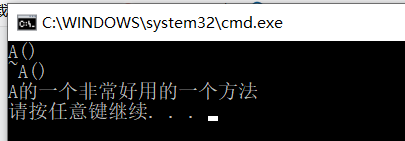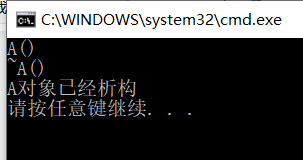使用普通裸指针造成的问题
#include <iostream>
#include <memory>
#include <thread>
using namespace std;
class A
{
public:
A() { cout << "A()" << endl; }
~A() { cout << "~A()" << endl; }
void funA()
{
cout << "A的一个非常好用的一个方法" << endl;
}
};
void hander01(A *p)
{
std::this_thread::sleep_for(std::chrono::seconds(2));
p->funA();
}
int main()
{
A *p = new A();
thread t1(hander01,p);
delete p;
t1.join();
}
运行结果:

A在析构完成之后还可以调用A的方法,这个操作是极其不安全的一个操作的,所以我们可以使用强弱智能指针来使得操作变得安全起来。
shared_ptr 和 weak_ptr的解决问题
#include <iostream>
#include <memory>
#include <thread>
using namespace std;
class A
{
public:
A() { cout << "A()" << endl; }
~A() { cout << "~A()" << endl; }
void funA()
{
cout << "A的一个非常好用的一个方法" << endl;
}
};
void handler01(weak_ptr<A> q)
{
//需要检测对象A是否存活
std::this_thread::sleep_for(std::chrono::seconds(2));
shared_ptr<A> ptmp = q.lock();
if (ptmp != nullptr)
{
ptmp->funA();
}
else
{
cout << "A对象已经析构" << endl;
}
}
int main()
{
{
shared_ptr<A> p(new A());
thread t1(handler01, weak_ptr<A>(p));
t1.detach();
}
std::this_thread::sleep_for(std::chrono::seconds(10));
}
运行结果:









 本文通过对比裸指针和智能指针的使用,展示了如何利用shared_ptr和weak_ptr来避免裸指针带来的不安全性。通过示例代码演示了在多线程环境下,智能指针能够确保对象在被引用时仍然有效。
本文通过对比裸指针和智能指针的使用,展示了如何利用shared_ptr和weak_ptr来避免裸指针带来的不安全性。通过示例代码演示了在多线程环境下,智能指针能够确保对象在被引用时仍然有效。
















 5031
5031

 被折叠的 条评论
为什么被折叠?
被折叠的 条评论
为什么被折叠?








